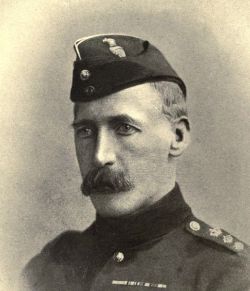Colonel Maurice Moore
Continuing to look at the life and times of remarkable Irishmen and women, today’s post features a man who played a significant role in the lead up to the 1916 Rising but who might not be known to many. His name was Colonel Maurice Moore who died in September 1939. A veteran of the Anglo-Boer War 1899-1902, it was much of what he witnessed in South Africa that drew Moore to the nationalist cause.
Colonel Maurice G. Moore whose death occurred on Friday of last week, al his residence, Sea View Terrace, Ailesbury Road, Dublin, at the age of 86, had a distinguished and varied career as a soldier and patriot. He was born at Moore Hall, Ballyglass, Co. Mayo, and was the son of the late George Moore M.P., and a brother of the late Mr. George Moore, the famous novelist. Col Moore joined the Connaught Rangers in 1875 and served in the Kaffir and Zulu wars in 1877-79…and in 1902 he was raised to the Order of Companion of the Bath, mid was made a Brevet Colonel. When he returned to Ireland after finishing his military service he took a keen interest in various patriotic movements, including the movement for an industrial revival. On the formation of the Irish National Volunteers in 1913, Col. Moore threw himself into the movement with enthusiasm and became a member of the Provisional Committee of the Volunteers. He sided with the Irish Parliamentary Party at the time of the split in the Volunteers and jointed the Irish National Volunteers.In 1917 he and a-number of officers of the Irish National Volunteers seized No. 44 Parnell Square, which was their headquarters, and declared the force independent of the control of the Irish Parliamentary Party. At this time Col. Moore himself was openly in sympathy with Sinn Fein, and during the Anglo-Irish war his house was raided several times by British Forces, and he had to go "on the run."
